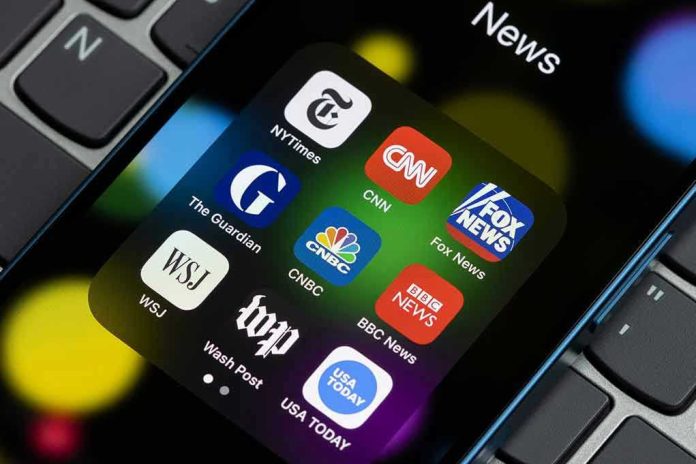
Donald Trump’s $1 billion ultimatum to the BBC has cracked open a global debate about media power, reputation, and the limits of free speech—making even the most distracted reader wonder where the real story ends and the showmanship begins.
Story Snapshot
- Trump threatens BBC with a $1bn lawsuit over alleged defamation in live coverage.
- BBC faces intense scrutiny, balancing editorial independence against legal risk.
- The case exposes stark differences between US and UK defamation laws.
- Outcome could set precedents for international media disputes and press freedom.
Trump’s Demand: The Anatomy of a $1 Billion Threat
Donald Trump publicly demanded an apology from the BBC, claiming their coverage defamed him and threatened to sue for $1 billion if they did not comply. Trump’s statement instantly became headline news, drawing both outrage and support. This confrontation isn’t just about bruised egos; it’s a high-stakes clash with international implications. The BBC, a publicly funded British institution, suddenly found itself in the crosshairs of one of America’s most polarizing figures, raising questions about the boundaries of journalistic criticism and the price of reputation.
The BBC’s initial reaction was measured. Executives reviewed the disputed content and weighed their response, all under the glare of global media attention. Trump’s past threats against outlets like CNN and The New York Times rarely led to courtroom victories, but this time the target is not just another American media giant—it’s one of the world’s most respected broadcasters, governed by different laws and public expectations.
Legal Landscape: Defamation, Jurisdiction, and the Power Play
The heart of Trump’s threat lies within the tangled web of defamation law. In the United States, public figures like Trump face daunting hurdles to prove defamation, needing to demonstrate actual malice. The United Kingdom’s standards are less forgiving to publishers, with a history of being more plaintiff-friendly. Trump’s legal team must navigate these differences, facing questions of jurisdiction, evidence, and cross-border enforcement. Experts suggest the chances of a $1 billion payout are slim, but the spectacle itself is designed to pressure and intimidate.
For the BBC, editorial independence is more than a slogan—it’s a safeguard against political interference. Yet, as international scrutiny intensifies, internal discussions focus on balancing freedom of the press with potential liability. Media law scholars warn that high-profile lawsuits, even if unsuccessful, can have a chilling effect, discouraging rigorous reporting and eroding public trust in journalism.
Media Accountability vs. Political Strategy: Who Wins?
Trump’s move fits a familiar pattern. Throughout his career, he has wielded the threat of legal action as a tool to control the narrative, energize his supporters, and challenge critics. The BBC, meanwhile, must defend its reputation without compromising its mission. The standoff exposes deeper tensions: How much power should a public figure have over the media? When does accountability cross the line into intimidation?
Political analysts view Trump’s demand as both a genuine grievance and a calculated strategy. By taking on a foreign broadcaster, he amplifies his profile and positions himself as a defender against perceived media bias. For the BBC, the challenge is to maintain credibility while navigating an unprecedented transatlantic dispute. The ripple effects extend far beyond the principals: newsrooms worldwide are watching to see whether the outcome will embolden litigants or reinforce safeguards for free expression.
International Implications: The Global Stakes for Press Freedom
The outcome of Trump’s threat could reshape international media law. If the BBC apologizes or pays damages, it may invite similar claims from other powerful figures, undermining editorial independence. If Trump’s suit fails—or never materializes—it could strengthen protections for journalists facing cross-border attacks. The broader industry is already taking note: coverage of controversial figures may become more cautious, and legal teams more vigilant.
At the heart of the dispute is a larger question—can media organizations hold the powerful to account without fear of financial ruin? The answer will echo in boardrooms, courtrooms, and newsrooms for years to come. Common sense and conservative values suggest that while reputation is important, freedom of the press must not be sacrificed at the altar of political convenience. The BBC-Trump standoff is more than a headline; it’s a test of how societies value truth, accountability, and the right to speak freely.
Sources:
NY Times: Trump’s history with media
Reuters: Trump’s previous lawsuits
Harvard Law Review: Defamation law in UK and US
Guardian: Defamation law analysis
Brookings Institution: Trump media strategy
Columbia Journalism Review: Trump media lawsuits







